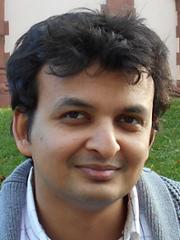
News
- date fixed: workshop to be held on Saturday, 30th of
September
- there will be published proceedings, negotiations with
publisher (Springer) are ongoing
- submission site is now open
Introduction
AI4AI aims to provide a platform for exchange of ideas and experiences under the general theme of AI for education, specialising on university education in AI, but interpreting AI in a broad sense.
This workshop held at ECAI 2023
brings together researchers involved in these diverse programs
dedicated to investigating, developing and exploring AI techniques
for AI and computer science education.
We also wish to contribute towards forming a European community on the
theme of AI for AI education, and foster basic
research as well as the development of intelligent assistance technology
(e.g., intelligent tutor systems) in a multi-disciplinary setting
in order to improve AI education by making use of AI technology
itself: AI4AI.
Besides researchers with a background in AI, we encourage interdisciplinary contributions from cognitive science and education technology.
Go back to the top
Call For Contributions
We invite submission of
- technical papers (full paper/short paper)
- evaluation methodology papers (full paper/short paper)
- application or demo papers (short paper)
- position papers (short paper)
- paper abstracts of accepted papers (single page)
Technical papers present novel ideas or finding and position results in context of AI-enhanced education of AI. For research-in-progress, submission of short papers are welcome. We particularly encourage young researchers to submit. We also invite authors who recently published results of interest to this workshop to submit a short summary paper which highlights the results and explains relevance.
Application contributions present the use or evaluation of AI techniques in an educational context. Evaluations can range from technology oriented (e.g., address software functioning in operational contexts) to human oriented (e.g., address usability or effects of use).
Demos focus on (novel) implementations put into practise. They can be ‘proof of concepts’, but also mature products. Contributions typically address the ‘extras’ needed to achieve a useful implementation.
In addition, there will be invited position talks by the worksshop organisers.
Submission
All contributions must be submitted via EasyChair.
All submissions must be in PDF format and must not exceed 6 pages
for full papers (plus one for references), respectively 3 pages for
short papers (plus one for references). Papers should be formatted
according to the ECAI
formatting guidelines.
All submissions will be evaluated in a peer review process and selected according to their quality, significance, originality, and potential to generate discussion. Each contribution will be reviewed by at least two referees from the Program Committee. Papers may be accepted for either oral or poster presentation.
Accepted papers will be published as a collection of working papers. As AI4AI is a workshop, not a conference, submission of the same paper to conferences (e.g., ECAI or IJCAI) or journals is acceptable, but must be indicated. To accommodate the publishing traditions of different fields, authors of accepted papers can ask that only a one-page abstract of their paper appear in the proceedings. The workshop is also open to people who would like to attend without submitting a paper.
All questions about submissions should be emailed to the contect organizers.
Important Dates
Be mindful of the following dates:
- July 21, 2023: Workshop Paper Due Date
- August 11, 2023: Notification of Paper Acceptance
- September 1, 2022: Camera-ready papers due
- September 30, 2023::
Workshop at ECAI, 9:00-17:00, room to be announced on site
Note: all deadlines are Central European Time
(CET), UTC +1, Paris, Brussels, Vienna, Kraków.
Go back to the top
Keynotes

Adish Singla |
AI-Driven Educational Technology for Introductory Programming
Computational thinking and basic programming skills are essential for everyone to thrive in nowadays digital society. Consequently, there is an increasing need to introduce computing and programming education at an early age, starting at elementary-level grades. However, given the conceptual and open-ended nature of programming tasks, novice learners often struggle when solving these tasks on their own. Given the scarcity of human tutoring resources to provide individualized assistance, AI-driven educational technology has the potential to provide scalable and automated assistance to struggling learners. In this talk, I will present our research on AI-driven techniques for automatically synthesizing new programming tasks, generating personalized feedback, and modeling learners' knowledge. I will highlight unique challenges and insights in the programming domain, which can also drive the next scientific breakthroughs in AI-driven education for other subject domains. I will conclude with directions for future work on AI-driven educational technology to make programming education effective and accessible for all.
Adish Singla is a faculty member at the Max Planck Institute for Software Systems (MPI-SWS), Germany, where he has been leading the Machine Teaching Group since 2017. He conducts research in the area of Machine Teaching, with a particular focus on open-ended learning and problem-solving domains. In recent years, his research has centered around developing AI-driven educational technology for introductory programming environments. He has received several awards for his research, including an AAAI Outstanding Paper Honorable Mention Award (2022) and an ERC Starting Grant (2021). He also has extensive experience working in the industry and is a recipient of several industry awards, including a research grant from Microsoft Research Ph.D. Scholarship Programme (2018), Facebook Graduate Fellowship (2015), Microsoft Tech Transfer Award (2011), and Microsoft Gold Star Award (2010).
|

Ken Forbus
|
Sketch Understanding for AI Education
Sketching is a natural way that people use to think through ideas and exchange them with others. Creating AI systems that can be partners in sketching is challenging, but sufficient progress has been made to support deploying sketch understanding systems in multiple domains. This talk describes our work on open-domain sketch understanding and show how it enables new kinds of sketch-based educational technologies. I focus on Sketch Worksheets, describing how they use qualitative visual reasoning and analogy to give on-the-spot feedback to students and assessment data for instructors. While most deployments have been in geoscience, I will describe how we’ve used them in our classes on cognitive modeling and on knowledge representation.
Kenneth D. Forbus is the Walter P. Murphy Professor of Computer Science and Professor of Education at Northwestern University. His research interests include qualitative reasoning, analogical reasoning and learning, spatial reasoning, sketch understanding, natural language understanding, cognitive architecture, reasoning system design, and AI for education and learning. He is a Fellow of the Association for the Advancement of Artificial Intelligence, the Cognitive Science Society, the Association for Computing Machinery, and the American Association for the Advancement of Science. He is the inaugural recipient of the Herbert A. Simon Prize, a recipient of the Humboldt Research Award and served as Chair of the Cognitive Science Society.
|
Workshop Program
Please consult the ECAI homepage
for details about the venue.
Keynotes:
Tentative workshop schedule:
%% 11:35 %% -> 11:50
| 9:00 | welcome |
| 9:30 | keynote by Adish Singla, Max Planck
Institute for Software Systems
AI-Driven Educational Technology for Introductory Programming |
| 10:30 | coffee break |
| technical session, full papers, focus topic: AI in programming education |
| 11:00 | Enhancing Computer Science Education by Automated Analysis of
Students’ Code Submissions (slides)
Lea Eileen Brauner, Frank Höppner |
| 11:20 | Model-Based-Diagnosis for Assistance in
Programming Exercises
Moritz Bayerkuhnlein, Diedrich Wolter |
| 11:40 | Language-Model Assisted Learning How to Program?
Jochen L. Leidner, Michael Reiche |
| 12:00 | Bridging the Programming Skill Gap with
ChatGPT: A Machine Learning Project with Business
Students
Michael Reiche, Jochen L. Leidner |
| 12:20 | poster spotlight
Scalable Interventions in Higher Education:
An AI-Supported Smartphone App to ASSIST
Self-Reflection
Johannes Berensa, Thomas Gößlb, Leandro Henaob, Luis Rumertb;*,
Moritz Salamonb and Kerstin Schneider
Analysis of Knowledge Tracing performance on synthesised student data
Panagiotis Pagonisa, Kai Hartunga, Di Wua, Munir Georgesa, and
Sören Gröttrupa
|
| 12:30 | lunch break |
| 13:30 | keynote by Ken Forbus, North
Western
Sketch Understanding for AI Education |
| technical session, full papers, focus topic:
AI techniques |
| 14:30 | poster spotlight |
| technical session, full papers, focus topic: AI
techniques in educational contexts |
| 14:40 | Guided Tours in ALeA:
Assembling Tailored Educational Dialogues from Semantically
Annotated Learning Objects (slides)
Jonas Betzendahl, Michael Kohlhase, Dennis Müller
|
| 15:00 | coffee break |
| 15:30 | Does Starting Deep Learning Homework Earlier Improve Grades?
Edward Raff, Cynthia Matuszek |
| 15:50 | Performance of Large Language Models in a
Computer Science Degree Program
Tim Krüger, Michael Gref |
| 16:10 | Topic Segmentation of Educational Video
Lectures Using Audio and Text
Markos Dimitsas, Jochen
L. Leidner |
| 16:30 | poster session |
| 17:00 | workshop closing |
Note: all times are Central European Time
(CET), UTC +1, Paris, Brussels, Vienna, Trier, Kraków.
Go back to the top
Organization
Organizing Committee
|
Diedrich Wolter is professor of Smart
Environments at the University of Bamberg, Germany.
His research interests are knowledge representation and
reasoning, hybrid AI, and applications of AI. Currently,
he is an investigator in the VoLL-KI project and seeks to
develop diagnosis and explanation techniques for intelligent tutoring system.
|
Jochen
L. Leidner, FRGS is a research professor of AI at the
university of the applied sciences Coburg, Germany.
His research is mostly focused on NLP and its
applications. Currently,
he is an investigator in the VoLL-KI project and
seeks to develop chatbot support for AI teaching.
|
Michael Kohlhase is professor for Knowledge
Representation/Processing at FAU
Erlangen-Nürnberg, Germany and and adjunct
associate professor for Computer Science at Carnegie
Mellon University, USA. His research interests include
knowledge representation for STEM (Science,
Technology, Engineering, Mathematics), inference-based
techniques for natural language processing,
computer-supported education and user assistance.
|
Ute Schmid is professor for
Cognitive Systems at University of Bamberg, Germany. Her research interests are mainly in the domain of comprehensible machine learning, explainable AI, and high-level learning on relational data, especially inductive programming. Research topics include generation of visual, verbal and example-based explanations; cognitive tutor systems; analogical problem solving and learning. Ute Schmid is a pioneer of Computer Science for Primary School (FELI) and is engaged in the domain of AI education.
|
Vania Dimitrova is professor of
Human-Centred Artificial Intelligence at the University of
Leeds, UK. Vania Dimitrova leads research activity on
human-centred artificial intelligence which builds
intelligent systems that help people make sense of data,
take decisions in complex settings, expand their
knowledge, learn from experience, and develop
self-regulation skills. She is currently President of the
International AI in Education Society.
|
Program Committee
- Marc Berges, University Erlangen-Nürnberg
- Jonas Betzendahl, University Erlangen-Nürnberg
- Bert Bredeweg, University of Amsterdam
- Vania Dimitrova, University of Leeds (co-organizer)
- Andreas Henrich, University of Bamberg
- Michae Kohlhase, University Erlangen-Nürnberg
(co-organizer)
- Theresa Kruse, University of Hildesheim
- Jochen L. Leidner, Coburg University of Applied
Sciences; University of Sheffield; KnowledgeSpaces
(co-organizer)
- Dominic Lohr, University Erlangen-Nürnberg
- Cynthia Matuszek, University of Maryland Baltimore
County
- Dennis Müller, University Erlangen-Nürnberg
- Ulrike Padó, HFT Stuttgart
- Ute Schmid, University of Bamberg (co-organizer)
- Jan Frederik Schaefer, University
Erlangen-Nürnberg
- Stefan Ultes, University of Bamberg
- Diedrich Wolter, University of Bamberg (co-organizer)
Go back to the top
Venue
The workshop will take place at ECAI 2023 in Kraków, Poland
Go back to the top







